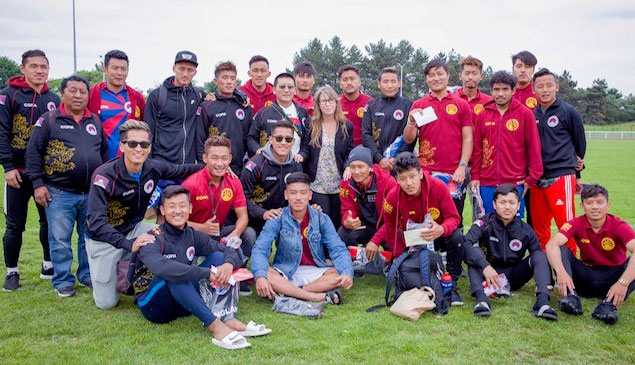
I’m not by any means a football fan, but the arrival of the Tibetan team in London for the CONIFA World Football Cup – bringing together dispossessed nations and others locked out of FIFA – kicked off something rather special.
For a start, no other team had been given a personal blessing by the Dalai Lama, who in a special audience before their visit to the UK urged them to set an example of compassion. They are the only team in the history of football, no doubt, to present their opponents with khatags, white blessing scarves, before the game – and to assert that winning or losing are not important. The British media hailed them as the undoubted stars of the show, with many journalists making a special effort just to attend the matches of the Tibetan team.
The controversial nature of their participation gained headlines, too. Organizer Paul Watson said that CONIFA were talking to several firms about sponsorship that would have totaled six figures. “But at quite a late stage they each came to us and said: ‘Um, yes, but you’d have to take Tibet out’,” he told The Guardian. “We’d underestimated the difficulty of coming up against China and the FIFA network.” What did CONIFA do? “Obviously we refused to comply.” Sometimes pushback against China and defense of principles comes from unexpected quarters.
That same sense of solidarity was evident at every match. And wherever the exile Tibetan team played, the exile Tibetan community of Britain came too, with Tibet flags, banners – and momos. In Bracknell Town, a fan wrote on Twitter that the Tibet supporters had brought food for everyone – “Not seen that at the Emirates before”. After matches impromptu picnics were held in parks near by; there was joyful circle dancing and a real sense of pride that Tibetans were competing in a world football tournament.
The ten-day event in London has brought together 16 teams from nations, minorities and regions not part of FIFA to compete in an alternative World Cup. The competitors include the Romani people, the North American region of Cascadia, Matabeleland, Panjab and United Koreans in Japan.
The players in the Tibetan team are from the exile diaspora in India, Nepal and Bhutan with some from North America, Europe and two from the UK. One of the team, Wangchuk, said that he had never been back to Tibet after escaping across the Himalayas as a child, carried by his mother, 17 years ago. She had said to him that in India, he would have more opportunities to study and work. If he remained in Tibet, she told him, he would have no education and have to do construction work.

Newspaper coverage of the Tibetan soccer team.
Another member of the team, Nyendak, told The Independent it is “a privilege to be part of the national team squad… I am really proud to represent Tibet globally.” He said that football is the closest thing Tibetans have to a national sport, and he believes the team will be backed “by all Tibetans, in and outside Tibet”.
There was a neat symbolism to the Tibetan team coming together in London. Prior to the Chinese invasion in 1949, Britain was the only country to formally recognise Tibet as an independent nation, because British representatives were stationed in Lhasa from 1904 to 1947 to liaise with the Tibetan government. And during this period, Tibetans were first introduced to football by the British Trade Agency in Gyantse. The introduction of British military training at Lhasa in 1913 and increase in the army and introduction of the modern police force in the early 1920s saw more football in Tibet. According to the Tibetan National Sports Association, some of the veteran players of popular teams like the Lhasa, the Potala, the Drapchi and Security Regiment, are still alive today.
After a match against Kabylia at Enfield – the Tibetan team had lost, but were philosophical, and a Tibetan friend observed simply that it could have been worse, it could have been 12-1 – I made an informal presentation to the team on behalf of ICT. Mindful of the historic connection, it included some England football team kitbags. But most of all we wanted to express our support and admiration for the spirit and grit of a team who have played with loyalty to their nation and culture first and foremost, and in doing so, succeeded in reaching people across the world with the story of Tibet.
